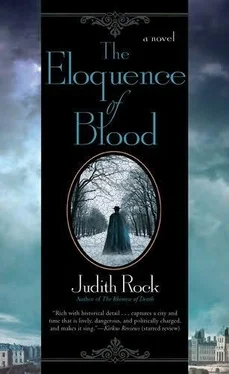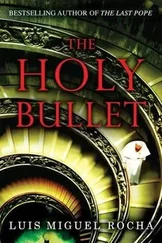Judith Rock - The Eloquence of Blood
Здесь есть возможность читать онлайн «Judith Rock - The Eloquence of Blood» весь текст электронной книги совершенно бесплатно (целиком полную версию без сокращений). В некоторых случаях можно слушать аудио, скачать через торрент в формате fb2 и присутствует краткое содержание. Жанр: Исторический детектив, на английском языке. Описание произведения, (предисловие) а так же отзывы посетителей доступны на портале библиотеки ЛибКат.
- Название:The Eloquence of Blood
- Автор:
- Жанр:
- Год:неизвестен
- ISBN:нет данных
- Рейтинг книги:5 / 5. Голосов: 1
-
Избранное:Добавить в избранное
- Отзывы:
-
Ваша оценка:
- 100
- 1
- 2
- 3
- 4
- 5
The Eloquence of Blood: краткое содержание, описание и аннотация
Предлагаем к чтению аннотацию, описание, краткое содержание или предисловие (зависит от того, что написал сам автор книги «The Eloquence of Blood»). Если вы не нашли необходимую информацию о книге — напишите в комментариях, мы постараемся отыскать её.
The Eloquence of Blood — читать онлайн бесплатно полную книгу (весь текст) целиком
Ниже представлен текст книги, разбитый по страницам. Система сохранения места последней прочитанной страницы, позволяет с удобством читать онлайн бесплатно книгу «The Eloquence of Blood», без необходимости каждый раз заново искать на чём Вы остановились. Поставьте закладку, и сможете в любой момент перейти на страницу, на которой закончили чтение.
Интервал:
Закладка:
Damiot turned. “Oh, dear.” He shifted miserably in his saddle.
“Mon lieutenant-general, a good New Year to you,” Charles said courteously, as though they were in a salon and there were not a small army at La Reynie’s back.
“And to you, Maitre du Luc.” La Reynie looked at Damiot.
“Monsieur La Reynie, may I present Pere Thomas Damiot?”
La Reynie bowed slightly and Damiot acknowledged him.
“Damiot?” La Reynie studied the priest’s face. “Your father is head of the Six Corps. A merchant goldsmith, I believe.”
Damiot nodded. “I see that you know everything about the city you keep, Monsieur La Reynie.”
La Reynie looked at Charles. “Unhappily, not everything.” He said something to the officer standing just behind him and then to Charles, “A small word, maitre.”
Warning Damiot with a look to stay where he was, Charles led Flamme after La Reynie, a little way along the street and out of earshot of the other police.
“What has happened, Monsieur La Reynie?” he said, when the lieutenant-general stopped. “I doubt this is how you normally spend your New Year’s Day.”
“You doubt correctly. My spies told me last evening, and again this morning, that trouble is likely here at St. Louis. At your college and your novice house, too. I have put armed men at each place, nearly all the daytime men I have. At dark, the night patrol will replace them.” La Reynie’s head whipped around as shouts and loud laughter erupted from across the street. He watched a gesticulating knot of men in knee-length mantles, their broad hats askew as they argued. “Drunks.” La Reynie sighed. “But it’s drunks who generally start the trouble. Which they’ll go on doing, until someone is charged with these murders.” His gaze swept the length of the street. “Until someone confesses,” he said flatly, refusing to meet Charles’s eyes.
Charles’s stomach turned over. La Reynie was talking about Gilles Brion. The Chatelet was notorious for its ways of making people “confess.”
“I still have not found Monsieur Bizeul’s friend Cantel. I did find three more investors in the smuggling scheme,” La Reynie went on. “Two proved beyond doubt that they were elsewhere during the time when Brion must have been killed.” La Reynie smiled sourly. “The third, on the other hand, has no proof. But he doesn’t need any. He’s seventy and frail, with only one foot. He lost the other forty years ago as one of Conde’s men in the Fronde revolution.” He stopped to watch his own men walking up and down the street in pairs, missing nothing, staying always within earshot of their fellows. “I can keep things quiet a while longer with shows of force in the street. And arrests, too, if it comes to it, though arrests may only stir the fires.” He shook his head. “But the weather is growing colder, there’s more and more sickness about, especially among the workers in the St. Victor quartier, prices are rising again-and we haven’t even begun the worst of the winter! People are ready to take their fears out on whatever comes to hand.”
“And Jesuits have come to hand.”
The lieutenant-general’s eyes held Charles’s. “And therefore, I have to produce the Mynette girl’s killer and Henri Brion’s. Do you understand?”
“I understand,” Charles said, colder inside than out, “that you have Gilles Brion in the Chatelet and will use him if you must.”
La Reynie twitched his cloak angrily aside, as though his smoldering anger were heating him. “I will not ‘use’ him! I have never, to my knowledge, executed the wrong man and I never want to. But Brion seems more than likely as his father’s killer, if not the girl’s. And he had plenty of reason for her murder, as you well know.” La Reynie sighed heavily. “There are other reasons for haste. On the thirtieth day of this month, the king is coming to a reception and dinner with the city worthies at the Hotel de Ville. Do you know how rarely the king comes to Paris? He hates Paris. But you wouldn’t know that, you’re a foreigner. I cannot let him come into a city on the edge of riots.” In Paris, a foreigner was anyone not from Paris.
“I may be a foreigner from darkest Languedoc,” Charles said dryly, “but I can count. We have nearly all of January to find the killer.”
“No. The king already knows of the unrest here. Have you forgotten that his confessor, Pere La Chaise, is one of your own? I have been told that the king wants this affair concluded, and quickly. He is furious that his own confessor’s order is being accused of murdering for gain. And furious at the thought of riots. I tell you, he hates unrest in Paris more than the pope hates the devil!” The lieutenant-general’s head whipped around again, as a roar of laughter rose by St. Catherine’s well. Someone’s hat, blown off in a gust of east wind, was rolling away down the street, chased by three skinny dogs.
La Reynie rubbed his tired face and turned back to Charles. “Do you have anything for me? Anything at all?”
With a pang of sympathy for the man’s obvious exhaustion, Charles gave up arguing.
“Nothing you will like. Paul Saglio, the servant Martine Mynette dismissed for being too forward, is innocent. We talked to him and his fellow servants in Vaugirard this morning, and it seems certain that he was there when she was killed. But I learned more about the Mynettes’ ex-gardener, Tito La Rue, the one Renee told us about, who was turned out in November for trying to get into Martine’s bedchamber. It seems that, from a child, he claimed Martine’s missing necklace as his own-God knows why. It seems unlikely that he’d come back and kill her over such a tiny thing. And I cannot imagine any reason for him to kill the notary. But since the necklace is missing, he ought to be questioned.”
“Find him. Did Renee tell you where he went when he left the Mynette house?”
“No. All I know is his name and that he’s in his midtwenties, middling tall and well fleshed, and that his hair is dark. And that he started life as a foundling.”
La Reynie’s face fell. “That’s all?”
Charles nodded toward the east. “I’m going now to the Foundling Hospital to ask about him.”
“The man was a foundling? And what-twenty years ago? Do you know how many thousands of children they care for? And their houses have been reformed and moved several times, so who knows what records they have?” The lieutenant-general looked ready to weep. “Oh, well, report to me what you find.” He turned away, his face eloquent with exactly how much help he expected to come out of Charles’s inquiries. Charles remounted and signaled to Damiot, and they rode toward the Faubourg St. Antoine.
“Old Marin looked more frightened than I’ve ever seen him,” Damiot said, as they passed the stately redbrick houses of the Place Royale. “What was the matter?”
“You know Marin?”
“I’ve seen him often enough in the streets.”
“I don’t know why he was so afraid. Maybe he’s getting crazier.”
“I feel sorry for beggars, but Paris has too many. How can ordinary people go about their business?”
“Rich people, you mean. Why shouldn’t they share what they have with God’s poor?”
“Why should they be assaulted by stench and sickness and insanity and the demon possessed every time they leave their houses? All those people can be cared for in public institutions like the Hopital General.”
Charles shook his head in disbelief. “Mon ami, haven’t you heard what’s said about places like the Hopital? They’re horrible. People who can’t help being poor don’t deserve that!”
Damiot sighed. “But there has to be something better than the street. Or that filthy mess those beggars have made out of the Louvre colonnade!”
Читать дальшеИнтервал:
Закладка:
Похожие книги на «The Eloquence of Blood»
Представляем Вашему вниманию похожие книги на «The Eloquence of Blood» списком для выбора. Мы отобрали схожую по названию и смыслу литературу в надежде предоставить читателям больше вариантов отыскать новые, интересные, ещё непрочитанные произведения.
Обсуждение, отзывы о книге «The Eloquence of Blood» и просто собственные мнения читателей. Оставьте ваши комментарии, напишите, что Вы думаете о произведении, его смысле или главных героях. Укажите что конкретно понравилось, а что нет, и почему Вы так считаете.












